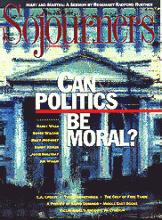On September 7, soldiers in the South African homeland of Ciskei rained machine-gun fire into a fleeing throng of unarmed African National Congress supporters who were in Bisho, the capital of Ciskei, for a protest march - leaving 28 dead and more than 200 injured. Rob Jenkins, an American volunteer with the Anglican diocese of Cape Town, wrote the following in the days after the massacre.
- The Editors
The dust has cleared, the blood has dried, and the names of 28 more black South Africans are added to the roster of apartheid's victims. In June there was the massacre at Boipatong. Now there is Bisho. Black South Africans are asking, "How much more must we be asked to endure?"
Many observers both inside and outside of South Africa, including the government of President F.W. de Klerk, are using the massacre at Bisho to emphasize why the African National Congress (ANC) and its alliance must return to the negotiating table. The savagery that took place at Bisho, however, is a chilling example of exactly why the ANC pulled out of constitutional negotiations.
How does one conduct negotiations that are supposed to lead to democracy with a government that fails to recognize one of the most fundamental democratic rights - the right to peaceful protest? The attitude of many of South Africa's blacks is captured in the placards held high at the demonstrations that are taking place across the country condemning the violence: "No talks while our people are dying."
Read the Full Article

